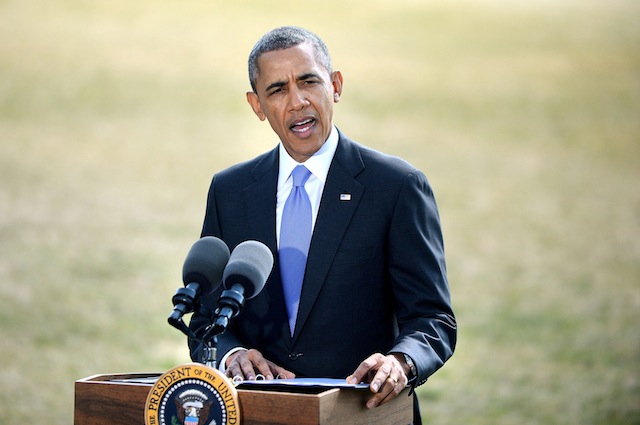By Lesley Clark and Hannah Allam
WASHINGTON — President Barack Obama delivered an Oval Office rebuke Wednesday to Russian President Vladimir Putin with Ukraine’s new prime minister at his side, warning that the U.S. and the international community would be “forced to apply a cost” should Russia refuse to withdraw from Crimea.
“There’s another path available and we hope that President Putin is willing to seize that path,” Obama told reporters as he sat next to newly installed Prime Minister Arseniy Yatsenyuk. “But if he does not, I am very confident that the international community will stand strongly behind the Ukrainian government in preserving its unity and its territorial integrity.”
Obama said the Ukrainian government is willing to talk with Russia and engage in a process that he said “could lead to different arrangements over time” for the Ukrainian region of Crimea.
“But, that’s not something that can be done with the barrel of a gun pointed at you,” he said.
The high-stakes meeting comes five days before a controversial Russia-backed referendum in Crimea on leaving Ukraine and joining Russia is to be held. The State Department announced that Secretary of State John Kerry will head to London for a meeting Friday with his Russian counterpart, Foreign Minister Sergey Lavrov.
The hastily called summit — after Kerry refused Lavrov’s invitation to Moscow earlier this week — appears to be an eleventh-hour attempt to get Putin to accept the White House’s offer of an “off-ramp” to ditch the secession referendum and open talks with the Ukrainians.
Obama expressed hope that Kerry’s mission to London would work out, though he did not seem especially optimistic.
“But we’ll keep on pressing,” the president said, adding that he and the international community “completely reject” what he called a “slapdash” election.
Yatsenyuk, a former opposition leader who just two weeks ago was elected prime minister, sat in a wing chair to Obama’s right and spoke resolutely.
“My country feels that the United States stands by the Ukrainian people,” he said in fluent English. “Mr. President, it’s all about freedom. We fight for our freedom, we fight for our independence, we fight for our sovereignty and we will never surrender.”
Yatsenyuk later spoke to an overflow crowd at the Atlantic Council, a foreign policy institute, thanking the United States and the European Union for responding to the crisis “with one voice.” He said Ukraine still considers Russia a partner and wants to get back to real bilateral relations, but it can’t with tanks and troops present as part of an “incursion.”
“If it’s about Crimea, we as a Ukrainian government are ready to start a national dialogue to increase the rights of autonomous republic of Crimea, starting with taxes and ending with other aspects, like language issues,” he said. “We’re ready to start this dialogue — but the constitutional one, in the Ukrainian Parliament, having everyone sitting at the table.”
The referendum Sunday, he warned, could be Putin’s door to a wider foray, perhaps even to a seizure of all of Ukraine. Though he vowed Ukrainians would never surrender, he added that Western financial and political support would be crucial to thwarting Putin. Yatsenyuk spoke with tempered optimism, stressing that he understood the difficulties of the effort needed to sway a defiant Moscow.
“This is the dramatic lesson for all of us: We need to articulate a real response to this kind of situation,” the Ukrainian leader said. “Let’s be frank. There is no clear-cut response. We are trying to find a way out.”
Yatsenyuk said Ukraine was ready for presidential elections May 25.
Ahead of the meeting at the White House, the leaders of the world’s seven most-industrialized nations — the U.S., Canada, France, Germany, Italy, Japan and the United Kingdom — issued a stern warning, urging Russia to cancel the referendum and saying that they won’t recognize the results.
“Any such referendum would have no legal effect,” the leaders said in a statement. “Given the lack of adequate preparation and the intimidating presence of Russian troops, it would also be a deeply flawed process which would have no moral force. For all these reason we would not recognize the outcome.”
Neither the visit by Yatsenyuk nor the statement by the seven nations is likely to change Putin’s mind, but it’s critical for the U.S., said James Goldgeier, who has worked for the White House National Security Council and is the dean of the School of International Service at American University.
“Putin’s calculations are unlikely to be affected by what we are doing, but given what he’s done, violating every international norm out there, it’s important for the U.S. and its partners to stand up and say this is not acceptable,” he said.
If the referendum goes forward, Goldgeier said he expects new sanctions to be announced Monday as the U.S. seeks to isolate Russia.
“All those things … we should do, but it doesn’t mean it’s going to change the future of Crimea,” he said.
Obama thanked Yatsenyuk for the Ukrainians’ “courage” and called on Congress to “act promptly” on an aid package that includes a $1 billion loan guarantee to Ukraine.
The Senate Foreign Relations Committee voted to approve the legislation on Wednesday, sending it to the full Senate for a vote. Similar legislation cleared the House on Tuesday. House Speaker John Boehner, R-Ohio, said it was “only a start on fulfilling our commitment to provide the president as many tools as needed to keep President Putin in check and protect the sovereignty of Russia’s neighbors.”
———
©2014 McClatchy Washington Bureau
Visit the McClatchy Washington Bureau at www.mcclatchydc.com
Distributed by MCT Information Services



